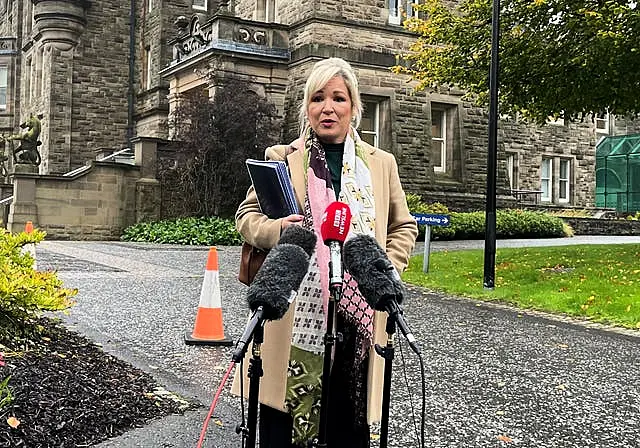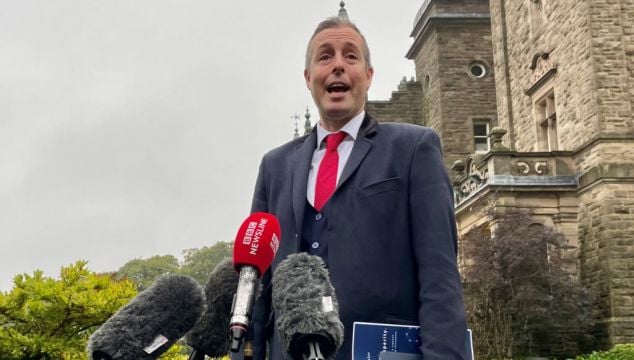Former DUP first minister Paul Givan has said it would take a “miracle” for a new Stormont executive to be formed ahead of a deadline for calling another Assembly election.
If the DUP do not agree to form a new power-sharing administration before next Friday, the UK government assumes a legal responsibility to call another poll.
The DUP has blocked the formation of a fully functioning ministerial executive since May’s Assembly election as part of its protest against the Northern Ireland Protocol.
The party has made clear it will not re-engage with power-sharing until decisive action is taken to remove the protocol.

The UK government has vowed to call another Assembly election if the October 28th deadline passes, with December 15th expected to be the likely date.
The four parties that would currently be entitled to sit on any new executive – Sinn Féin, the DUP, Alliance Party and UUP – met the head of the NI Civil Service Jayne Brady on Thursday to discuss what the future will hold for Stormont departments if the deadline passes.
While Northern Ireland currently has no first or deputy first ministers, other ministers who served in the previous mandate have remained in post following’s May’s election, albeit they have been significantly constrained in the decision they can take.
If Friday’s deadline passes without a full executive having been established, those remaining ministers will cease to hold office.
Commenting on the chances of the DUP changing its stance before next Friday, Mr Givan pointed to the British government’s domestic difficulties and questioned its capacity to secure sufficient concessions on the protocol in the coming days.
“The days of trusting a prime minister to stand by the unionist community in Northern Ireland is long gone,” said the Lagan Valley MLA.
“Our position has been consistent on this, it isn’t going to change and I hope we can make progress. I want the institutions to be up and running, but I think it would take a miracle for that to happen before the deadline of Friday.”

Mr Givan also appeared to rule out the potential of the DUP agreeing to re-form an executive for a brief period, only to leave it again almost immediately.
That tactic would potentially reset the clock on the six-month legislative deadline for calling an election.
Asked about that possible approach, Mr Givan said his party does not intend to let the UK government “off the hook” on its commitments to secure changes to the protocol.
Sinn Féin vice president Michelle O’Neill said Ms Brady painted a “very bleak picture” about Stormont’s financial situation if a powersharing executive is not formed next week.
Ms O’Neill accused the DUP of denying people democracy as she accused the party of failing to respect the result of May’s election, which Sinn Féin emerged from as the largest party.
She said it appeared that Northern Ireland was on course for another election.
“We’re being denied democracy by the DUP at this moment in time,” she said.
“So next Friday we’ll have departments with nobody at the helm, nobody there taking decisions, that’s not good enough for the public who are living through the worst cost living crisis in the generation.”
The UK government has vowed to secure changes to the protocol, either by a negotiated compromise with the EU or through proposed domestic legislation which would empower ministers to scrap the arrangements without the approval of Brussels.

Relations between the UK and the EU appear to have improved in recent weeks and London and Brussels have been talking up the potential for a deal through fresh negotiations.
However, the chances of an imminent breakthrough appear to have receded amid the Conservative Party turbulence at Westminster.
The UK government could potentially change the October 28th election deadline by way of emergency legislation.
Ministers have shown no inclination to do that to date. It remains to be seen whether that stance will remain unchanged in the coming days.
Following the meeting with Ms Brady, Alliance leader Naomi Long urged the DUP to “get real” about there Northern Ireland sat on the British government’s list of priorities.
“I think realistically the window of opportunity for resolving the issues satisfactorily to everyone’s satisfaction and getting an executive back up and running is closing rapidly,” she said.
“The government has bigger problems right now than what’s happening in Northern Ireland.”

Ms Long added: “We are in the bizarre situation where our politics looks less dysfunctional than national politics right now and that takes some doing.”
Ulster Unionist leader Doug Beattie said the budgetary constraints detailed by Ms Brady at the meeting were “eye watering and overwhelming”.
He said the “chaos” in Westminster was hindering the ability of the UK government to support Northern Ireland.
“The lights are on in government but nobody’s home,” he said.
“There’s nobody leading, there’s no leadership. There’s no confidence in them.
“And if there’s no confidence in them, how are we even here to look to them to offer us support to deal with the issues that we’ve got here.
“The Conservative government are going to have to get a grip of this.”







